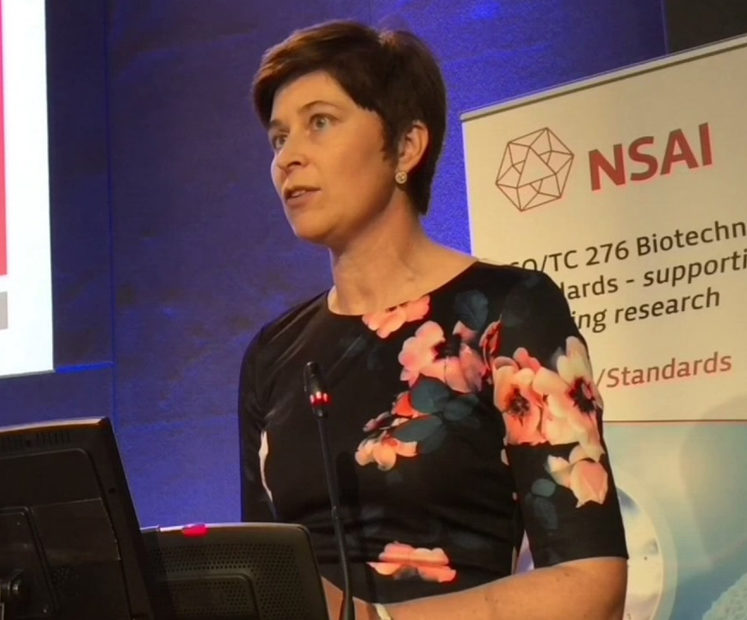The National Standards Authority of Ireland (NSAI) saw increased demand for its services in 2018 against a backdrop of a strong performance by the Irish economy. There were significant developments for NSAI, particularly in the standards area, with 1,318 standards published last year. Among them were the standard for Pyrite and Mica I.S. 465, and the standard for occupational health and safety management systems ISO 45001.
The Authority’s 2018 Annual Report, published today, reveals that over 1,600 subject matter experts sit on more than 200 committees, up 193 on 2017. There are now more than 24,000 standards in the NSAI catalogue.
Commenting on the publication of the 2018 Annual Report, Minister of State for Trade, Employment, Business, EU Digital Single Market and Data Protection, Pat Breen T.D. said:
“The demand for NSAI’s services in standards, certification and metrology continues to grow each year. In 2018, the NSAI inspected over 15,600 measuring instruments including taxi meters, petrol pumps and supermarket scales. That is an increase of more than 1,600 when compared with 2017. It is through the NSAI that consumers can rely on and have confidence in measurement in trade.
“The NSAI also published 1,318 standards last year. Standards are crucial in today’s global marketplace and can offer a competitive edge. I would encourage all companies, particularly SMEs, to implement ISO standards, which can help them reduce their costs and enhance their competitiveness.”
The role of standardization and certification in the global economy means consumers everywhere can have confidence that the goods and services they buy are safe, reliable and of good quality. In a fast-changing market place, standards and certification are fundamental to facilitating international trade, and can help companies grow, innovate and compete on the world stage. Standards are of little benefit unless adopted and implemented by businesses in processes and products. In this way, certification to international standards is vital in helping businesses become more resilient.
Regulators and government count on standards to help develop better regulation, knowing they have a sound basis thanks to the involvement of globally-established experts.
NSAI Chief Executive Geraldine Larkin says, “More and more businesses are recognising that standards can offer them a competitive advantage and a way to overcome potential barriers to trade. By actively engaging in standards committees, Irish companies can ensure they are ahead of the curve when it comes to product innovation and ensuring they continue to meet international trade requirements.”
Key Achievements in 2018
#Pyrite and Mica protocol published
NSAI this year published a standard protocol called I.S. 465, which will be used to assess homes suspected of being affected by pyrite or mica. It will be referenced by engineers, geologists and laboratories to assess, test and categorise the damage in properties negatively affected by defective concrete blocks, due to excessive free muscovite mica and pyrite. It will also give guidance on remedial works, on what, if any, remedial works might be carried out. The Mica Action Group publicly welcomed the NSAI standard and said it was a positive step.
#Draft guidelines issued on new National Wiring Rules
In December, the new National Wiring Rules were opened for consultation. It is the first major revision to the standard in over a decade. Important changes have been made in areas like electrical installation, safety and energy efficiency. The draft revisions will improve safeguards and bring industry requirements in line with technical developments and best practice in Europe.
#IS0 45001
In March the NSAI launched ISO 45001 for Occupational Health and Safety. It gives organisations a framework to increase safety, reduce workplace risks and enhance health and well-being at work. More than fifty Irish companies were among the first organisations in the world to achieve certification to the new global health and safety standard, which sets the minimum standard of practice to protect employees worldwide.
#Brexit Unit established
Amid growing uncertainty concerning the final outcome of the negotiations between the EU and the UK on what the future trading relationship between the EU and UK will ultimately look like, Irish businesses need to proactively take steps to get Brexit ready. It is for this reason the NSAI’s Brexit Unit was established in July 2018. The team represented NSAI at numerous events across the country last year, as part of the Government’s ‘Getting Ireland Brexit Ready’ campaign. The Brexit unit also carried out a comprehensive review of the EU Commission’s Nando website to ascertain how many Irish companies are certified by a UK notified body, and how this may affect them after Brexit. Arising from the research, key messages were formulated on the Brexit impacts for standards and certification, in areas such as construction, medical devices and green procurement.
#Medical Devices
NSAI has been confirmed as a recognised Auditing Organisation for the Medical Device Single Audit Programme (MDSAP), a global certification scheme for Medical Devices. It is one of only 14 organisations with this status and confirms the organisations’ standing as a leading body in the medical devices sector and enhances Ireland’s credentials as a centre of excellence for the medical devices industry.
#SI Redefinition
History was made on Friday November 16th, as leading figures in metrology from 60 nations voted to change one of the pillars of science, the kilogram. Since 1889, the kilogram has been defined by a piece of metal held in a triple-locked vault in the International Bureau of Weights and Measures laboratory in France. Several exact copies or national Prototype Kilograms were made and placed in national metrology laboratories around the world to calibrate measurements in their own countries. Ireland’s copy of the kilogram resides in the National Metrology Laboratory in Glasnevin which is run by the NSAI. An ‘electronic kilogram’ will be the new baseline measure of mass.
#Changes to The Maximum Taxi Fare
The National Transport Authority approved the proposed increase in the maximum taxi fare by an average of 3.22%, to take effect on 01 February 2018. All taximeters had to be calibrated and verified with the new fare, to be able to operate legally. Verification was completed by NSAI Legal Metrology through its contractor Applus.













